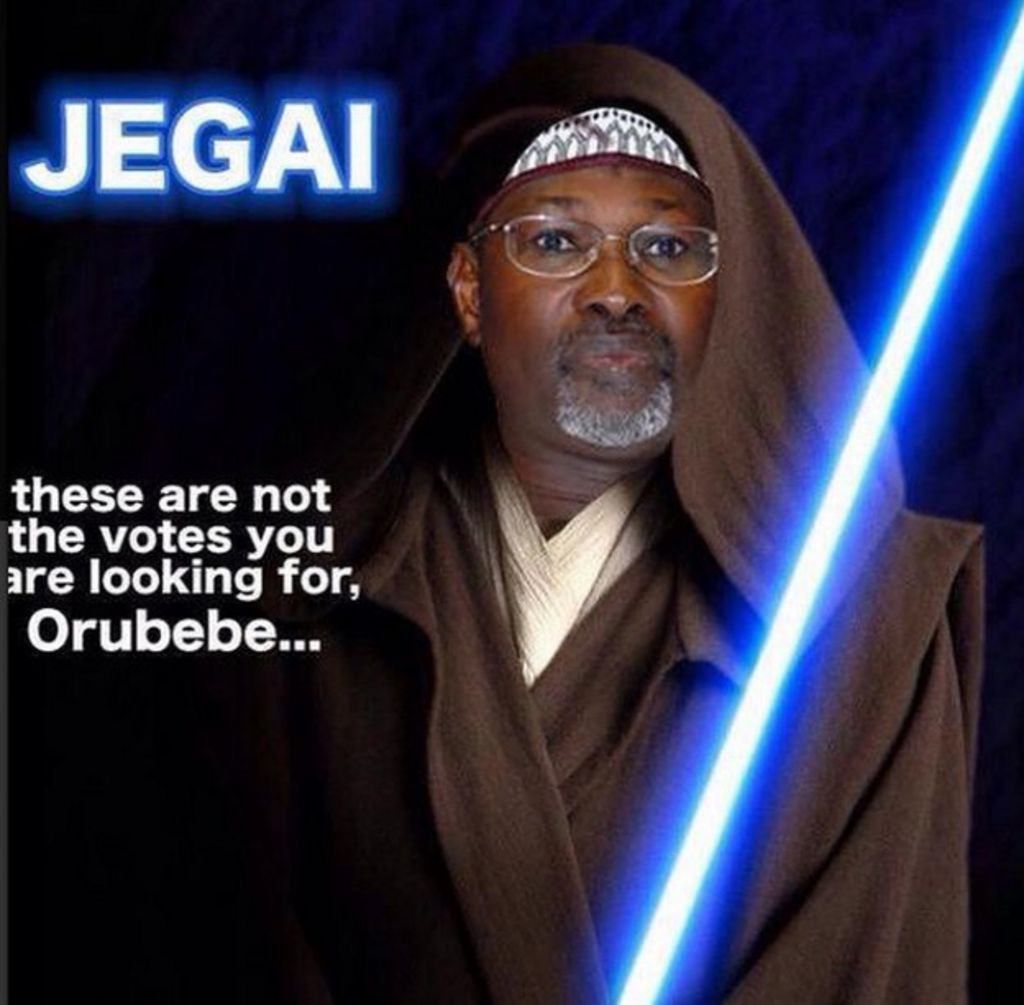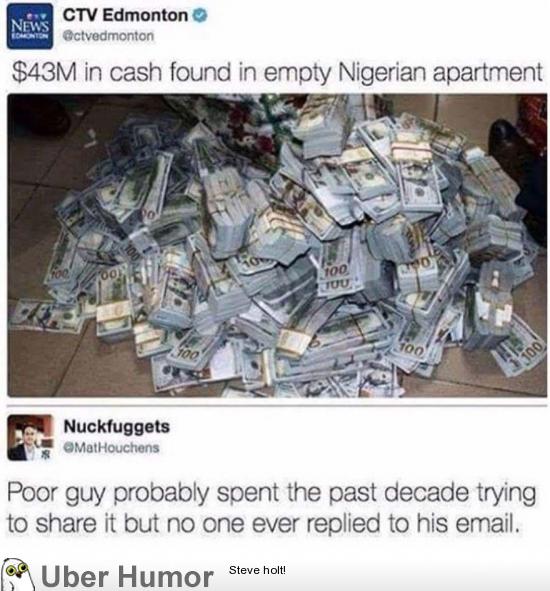Let me tell you something crazy, my friend. You’ve probably seen it somewhere on the internet, maybe in a comment section, a meme page, or even in your email inbox. The Nigerian Prince Meme is one of those viral sensations that just won’t go away. It’s like a digital ghost that keeps popping up, reminding us of the weird and wonderful world of online scams. But hold up, this isn’t just about some random email promising millions of dollars. This is a story that goes deeper than you think, trust me.
Now, before we dive headfirst into this wild ride, let’s talk about what makes this meme so iconic. The Nigerian Prince Meme isn’t just a joke—it’s a cultural phenomenon. It’s the kind of thing that sticks in your mind, like that one song you can’t stop humming. And honestly, who can blame us? The whole concept is absurd, hilarious, and just a little bit tragic. It’s a reminder of how the internet can turn something so serious into a laughing matter.
So, why are we even talking about this? Well, my friend, the Nigerian Prince Meme is more than just a funny picture with text. It’s a reflection of how we interact with the digital world, how we process scams, and how we find humor in the strangest places. Stick around, because I’m about to take you on a journey through the history, psychology, and cultural impact of this legendary meme.
Read also:Subhashree Sahu A Rising Star In The Entertainment World
Table of Contents
- The Origins of the Nigerian Prince Scam
- How the Scam Became a Meme
- The Psychology Behind Why We Laugh
- Cultural Impact of the Meme
- Popular Variations of the Meme
- Real-Life Examples of the Meme
- Statistics and Trends
- Criticism and Controversy
- The Future of the Meme
- Wrapping It Up
The Origins of the Nigerian Prince Scam
Alright, let’s rewind the clock for a sec. The Nigerian Prince Scam, also known as the "Advance Fee Fraud," has been around way longer than you think. Believe it or not, this scam didn’t start with the internet. It dates back to the 18th century, when con artists would send letters to unsuspecting victims, promising them riches in exchange for a small fee. Fast forward to the late 1990s, and this scam found its perfect home on the World Wide Web.
Here’s how it usually works: You receive an email from a "Nigerian Prince" or some high-ranking official who claims to have access to millions of dollars. All they need is your help—and a small fee—to transfer the money to your account. Sounds too good to be true, right? That’s because it is. But back in the day, people fell for it. Hard.
The scam became so widespread that it earned its own nickname: "419 Fraud," named after the section of the Nigerian penal code that deals with fraud. It’s wild to think about how something so ridiculous managed to dupe so many people, but hey, that’s the power of desperation and greed.
Why Did the Scam Work?
Let’s break it down. The Nigerian Prince Scam worked because it preyed on two basic human emotions: hope and fear. Hope that you could become rich overnight, and fear that you’d miss out on the opportunity of a lifetime. Add to that the anonymity of the internet, and you’ve got a recipe for disaster—or comedy, depending on how you look at it.
How the Scam Became a Meme
Now here’s where things get interesting. As the internet evolved, so did our sense of humor. Somewhere along the line, people realized that the Nigerian Prince Scam was just too good to ignore. The absurdity of it all—the broken English, the exaggerated promises, the sheer audacity—made it ripe for memeification.
And so, the Nigerian Prince Meme was born. At first, it was just a simple image with a caption, poking fun at the scam’s ridiculousness. But over time, it grew into something much bigger. It became a symbol of internet culture, a reminder of how we’ve learned to laugh at the absurdities of life.
Read also:Kash Patel Eyes Condition The Story Behind The Spotlight
Key Features of the Meme
- Broken English: “I am the son of a deposed Nigerian prince.”
- Over-the-top promises: “You will receive $10 million dollars.”
- Classic email format: “Dear Sir/Madam…”
- Excessive use of capital letters: “THIS IS VERY IMPORTANT!”
The Psychology Behind Why We Laugh
But why do we find this scam so funny? It’s not exactly a lighthearted topic, is it? Well, my friend, that’s where psychology comes in. Humans have a natural tendency to find humor in the absurd. It’s a defense mechanism, a way to cope with the craziness of life. When we see something as ridiculous as the Nigerian Prince Scam, our brains go, “Wait, what? This is insane!” And then we laugh.
There’s also something comforting about making fun of scams. It’s a way of saying, “Yeah, this is dumb, but we’re smarter than that.” It’s a form of empowerment, a way to take back control in a world that can sometimes feel overwhelming.
Cultural Impact of the Meme
Let’s talk about the bigger picture. The Nigerian Prince Meme has had a massive impact on pop culture. It’s been referenced in movies, TV shows, and even music. It’s become a shorthand for anything that’s overly exaggerated or just plain ridiculous. And let’s not forget its role in raising awareness about online scams. Thanks to this meme, more people are now aware of the dangers lurking in their inboxes.
But here’s the thing: the meme isn’t just about entertainment. It’s also a commentary on the digital age. It highlights the tension between trust and skepticism in the online world. In a way, it’s a reminder to always question what you see on the internet.
Examples in Media
- TV Shows: “The Good Place” featured a hilarious take on the scam.
- Movies: “The Internet’s Own Boy” discussed the meme in the context of online culture.
- Music: Artists like Childish Gambino have referenced the meme in their lyrics.
Popular Variations of the Meme
Like any good meme, the Nigerian Prince Meme has evolved over time. People have put their own spin on it, creating countless variations that keep the joke fresh. Some of the most popular ones include:
Classic Version
This is the original format, featuring a picture of a guy in a crown (or sometimes just a guy in a suit) with a caption like, “I am the son of a deposed Nigerian prince.”
Modern Twist
These versions often incorporate current events or pop culture references. For example, there’s one that says, “I am the son of a deposed Bitcoin prince.” Get it? It’s a nod to the rise of cryptocurrency scams.
Parody Accounts
Some people have taken the meme to the next level by creating parody accounts on social media. These accounts send out fake emails in the style of the Nigerian Prince Scam, often with hilarious results.
Real-Life Examples of the Meme
Believe it or not, there are people out there who still fall for the Nigerian Prince Scam. In fact, according to the FBI, victims lose millions of dollars every year to advance fee fraud. But there are also stories of people turning the tables on the scammers, using humor to fight back.
Stories of Revenge
- One guy spent months pretending to be interested in a scammer’s offer, only to send them a picture of a cat instead of money.
- Another person created a fake identity, complete with a backstory and forged documents, just to mess with the scammers.
Statistics and Trends
Let’s talk numbers. According to a report by the Anti-Phishing Working Group, advance fee fraud accounted for 37% of all phishing attacks in 2022. That’s a lot of people falling for the scam. But here’s the good news: awareness is growing. Thanks in part to memes like this one, more people are learning how to spot phishing attempts.
And the numbers don’t lie. A survey conducted by Norton found that 67% of people are now more cautious about opening suspicious emails. That’s progress, my friend. Progress!
Criticism and Controversy
Of course, not everyone is a fan of the Nigerian Prince Meme. Some people argue that it perpetuates negative stereotypes about Nigeria and its people. It’s a valid concern, and one that deserves attention. While the meme is meant to be funny, it’s important to remember the real-world implications of our jokes.
On the flip side, defenders of the meme argue that it’s not about Nigeria at all. It’s about the scam itself, and the absurdity of it all. Plus, many Nigerians have embraced the meme, using it as a way to comment on corruption and inequality in their country.
The Future of the Meme
So, what’s next for the Nigerian Prince Meme? Well, my friend, memes have a way of sticking around. As long as there are scammers out there trying to dupe people, there will be memes making fun of them. And who knows? Maybe one day we’ll see a Nigerian Prince Meme 2.0, featuring AI-generated scammers or something equally wild.
But here’s the thing: the meme isn’t just about laughter. It’s about awareness. It’s about teaching people to be smarter, more skeptical, and more informed. And in a world where scams are becoming more sophisticated by the day, that’s a lesson we can all benefit from.
Wrapping It Up
Let’s recap, shall we? The Nigerian Prince Meme is more than just a joke. It’s a cultural phenomenon, a commentary on the digital age, and a reminder to always question what you see online. It’s absurd, hilarious, and just a little bit tragic. But most importantly, it’s a part of our shared internet history.
So, what can you do? First, stay informed. Learn how to spot scams, and don’t be afraid to call them out when you see them. Second, share this article with your friends. Spread the word, and help us keep the internet a little safer. And finally, don’t forget to laugh. After all, laughter is the best medicine, even when it comes to Nigerian princes.
Now, go out there and meme responsibly, my friend. The internet needs more of your brilliance. And if you’ve got any stories to share, drop them in the comments below. Let’s keep the conversation going!


